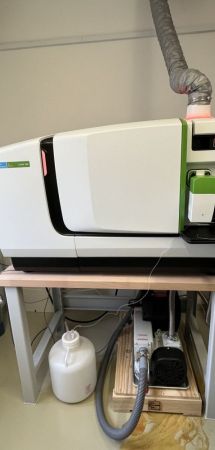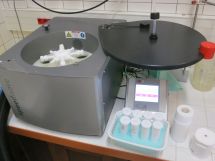
Základní vybavení skupiny zahrnuje dva hmotnostní spektrometry s indukčně vázaným plazmatem (ICP-MS). Starší přístroj NexION 350D firmy Perkin-Elmer je vybaven technologií tzv. univerzální cely, ve které lze spektrální interference zaviněné polyatomickými ionty odstraňovat jak v režimu reakční cely, tak i režimu kolizní cely, a to za použití amoniaku jakožto reakčního plynu. Díky možnosti ultrarychlého měření signálu (minimální integrační doba signálu 0,01 ms) je možné pomocí tohoto přístroje analyzovat velikost jednotlivých nanočástic.
Nově je laboratoř vybavena špičkovým přístrojem NexION 5000, který má o řád vyšší citlivost než model 350D. Jedná se o multi-kvadrupólový systém umožňující efektivní eliminaci spektrálních interferencí v MS/MS režimu. Je vybaven také funkcemi EDS pro elektronické ředění vzorků a AMS pro ředění aerosolu argonem, které zvyšují lineární rozsah měření.
Pro studování plošného rozložení prvků je k dispozici modul laserové ablace LSX-213 G2+ (Teledyne Photon Machines) s prostorovým rozlišením až 4 µm.
Laboratoř je dále vybavena kapalinovým chromatografem (LC) Perkin-Elmer a mikrovlnným rozkladným zařízením pro přípravu vzorků Speedwave.
Činnost skupiny je zaměřena na speciační analýzu stopových prvků v rostlinných materiálech pomocí on-line spojení LC a ICP-MS a na stopovou prvkovou analýzu v nejrůznějších materiálech, jako jsou vody, živočišné a rostlinné tkáně, půdy, horniny, katalyzátory, pevné prachové částice z atmosféry apod.
| Vedoucí: |
doc. Ing. Antonín Kaňa, Ph.D. |
| Členové: |
Ing. Magda Vosmanská, CSc. Ing. Kristýna Lapčíková, Dr. sc. ETH Zürich |
| Doktorandi: |
Ing. Petr Rudolf (AK) |
v závorce uvedení školitelé: AK = doc. Kaňa
-
Zaměření skupiny
Těžiště metod stopové prvkové analýzy se v posledních desetiletích přesouvá z optických metod (atomová absorpční a optická emisní spektrometrie) k metodám hmotnostní spektrometrie. Zejména se jedná o hmotnostní spektrometrii s indukčně vázaným plazmatem (ICP-MS), která vykazuje výborné provozní charakteristiky vhodné pro rutinní aplikace. Meze detekce pro kovy jsou často na úrovni menší než ng/l, dynamický rozsah metody přesahuje deset koncentračních řádů a snadno se provádí víceprvková analýza.
Současné vybavení zahrnuje dva hmotnostní spektrometry s indukčně vázaným plazmatem. Starší přístroj NexIon 350D firmy Perkin-Elmer je vybaven novou technologií tzv. univerzální cely, ve které lze spektrální interference zaviněné polyatomickými ionty odstraňovat jak v režimu reakční cely, tak i režimu kolizní cely, a to i za použití amoniaku jakožto reakčního plynu. Díky možnosti ultrarychlého měření signálu (minimální integrační doba signálu 0,01 ms) je možné pomocí tohoto přístroje analyzovat velikost jednotlivých nanočástic. Tento přístroj je využíván i ve výuce studentů magisterského studia.
Nově je laboratoř vybavena špičkovým přístrojem NexIon 5000 firmy Perkin-Elmer, který má o řád vyšší citlivost než model 350D. Jedná se o multi-kvadrupólový systém umožňující efektivní eliminaci spektrálních interferencí v MS/MS režimu. Je vybaven také funkcemi EDS pro elektronické ředění vzorků a AMS pro ředění aerosolu argonem, které zvyšují lineární rozsah měření.
Pro studování plošného rozložení prvků je k dispozici modul laserové ablace LSX-213 G2+ (Teledyne Photon Machines) s prostorovým rozlišením až 4 µm.
Laboratoř je dále vybavena kapalinovým chromatografem (LC) Perkin-Elmer a mikrovlnným rozkladným zařízením pro přípravu vzorků Speedwave.
Činnost skupiny je zaměřena na:
Speciační analýzy stopových prvků v biotických matricích:
- vývoj metodik měření pomocí on-line spojení LC-ICP-MS
- analýza rostlinných extraktů, sledování změn speciace stopových prvků, zejména selenu, během vegetace
- speciační analýza arsenu v potravinách
Aplikace metody ICP-MS pro stanovení celkové koncentrace prvku:
- vývoj, validace a odhad nejistot stanovení stopových množství kovů v biotických matricích metodou ICP-MS
- aplikace univerzální cely pro odstranění polyatomických iontů
- výzkum metodiky analýzy roztoků s vysokým podílem organické složky
- stanovení stopových prvků v nejrůznějších matricích, např. živočišných a rostlinných tkání, potravinách a nápojích, léčivech, katalyzátorech, pevných prachových částicích z atmosféry apod.
Charakterizace anorganických nanočástic (NP) pomocí analýzy jednotlivých částic (sp-ICP-MS)
- optimalizace měřícího procesu
- analýza Ag NP v kosmetických přípravcích
- analýza Ag NP v potravinách (ve spolupráci s Ústavem analýzy potravin a výživy)
- vývoj metodik měření pomocí on-line spojení LC-ICP-MS
|
Hmotnostní spektrometr PE NexION 350D
|
Laserová ablace LSX-213 G2+, Teledyne Photon Machines |
Výběr témat závěrečných prací z posledních let:
- Speciační analýza selenu v potravinářsky významných mikroorganismech
- Stanovení stopových prvků v destilátech hmotnostní spektrometrií s indukčně vázaným plazmatem
- Stanovení kovů a metaloidů v lidských vlasech pro klinickou forenzní toxikologii
- Stanovení stopových prvků v koření metodami atomové spektrometrie
- Prvková analýza kávy
- Stanovení nanočástic metodou sp-ICP-MS v komerčně dostupných kosmetických přípravcích
- Autentizace původu vína na základě obsahu stopových prvků
- Obsah těžkých kovů v kosmetických přípravcích

